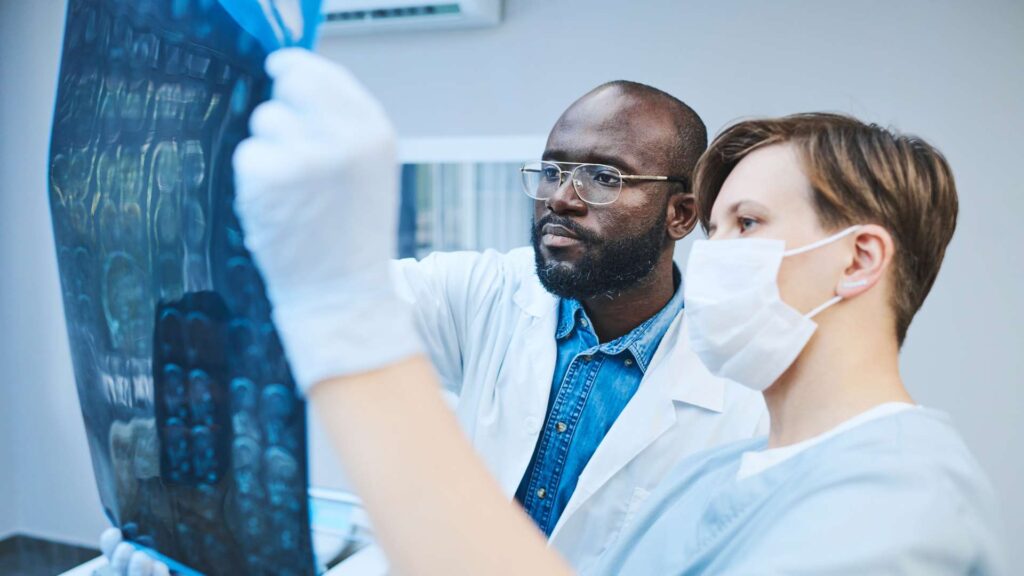Table of Contents
Healthcare decisions are rarely straightforward. A new diagnosis, a recommendation for surgery, or even ambiguity about future therapy can leave families dazed and confused. In these moments, many people wonder whether to trust the first opinion or seek a second one. This is where a virtual second opinion environment can be helpful.
While second opinions are usually in-person engagements and require patients to travel to another clinic or hospital, a virtual second opinion option allows you to examine leading medical specialists through clinically directed remote examination and treatment plans. This model saves time and money, and it’s reassuring to have expertise from the comfort of your own home. Virtual second opinions: when to seek and why. We tell you.
When to Get a Second Opinion
While not every situation calls for a second opinion, there are many scenarios where it’s highly recommended. Below are some common situations in which patients benefit most from seeking additional expert guidance:
1. Complex or Serious Diagnoses
If you’ve received a diagnosis of cancer, heart disease, neurological disorders, or any other life-altering condition, a second opinion is invaluable. These conditions often involve complex treatment decisions, and another perspective can ensure the diagnosis is correct and the recommended plan is the most effective.
2. Surgical Recommendations
When a doctor suggests surgery—particularly invasive or risky procedures—getting a second opinion can help determine whether the surgery is necessary, whether less invasive alternatives exist, and whether the timing is appropriate. Many patients discover less aggressive treatment paths this way.
3. Rare or Uncommon Conditions
Finding local specialists with deep expertise in rare diseases is often difficult. A virtual second opinion connects patients with nationally recognized experts specializing in these conditions, providing access to the latest research and innovative treatments.
4. Ineffective or Unexpected Treatment Results
If your current treatment isn’t working as expected or is producing unusual side effects, a second opinion can help identify alternative therapies or confirm whether the course of treatment should continue.
5. Desire for Peace of Mind
Even in less urgent cases, some people simply want reassurance before committing to a long-term treatment or lifestyle adjustment. A second opinion offers that confidence, helping families move forward with trust in their decisions.
Research shows that nearly 70% of second opinions result in changes to diagnosis or treatment plans, highlighting the importance of a second opinion.
How to Access Virtual Second Opinions
Dedicated platforms and advancements in telemedicine have greatly simplified the process of seeking a second opinion. Here’s a step-by-step breakdown of how it usually works:
Step 1: Choose a Trusted Platform
Patients start by selecting a reliable virtual second opinion provider. Many are associated with well-known hospitals or networks, such as the Cleveland Clinic, Mayo Clinic, or Johns Hopkins. Others, like digital health platforms, connect patients with national networks of physicians.
Step 2: Provide Medical Records and History
Most platforms require you to upload your complete medical history, diagnostic tests, lab reports, imaging scans, and treatment notes. Some services even assign a care coordinator to gather records directly from your providers, making the process less stressful.
Step 3: Expert Review
A specialist thoroughly reviews your records upon receipt. They may consult a team of experts or colleagues in different specialties before forming their opinion.
Step 4: Receive the Second Opinion
The outcome is typically delivered as a detailed written report or through a virtual consultation with the reviewing physician. The report often includes confirmation of your diagnosis, new insights, alternative treatments, or suggestions for further testing.
Step 5: Discuss with Your Current Provider
The final step is sharing the second opinion with your primary doctor or specialist. This collaborative approach, blending multiple expert perspectives, helps you make informed decisions.
For most patients, the process takes between a few days and two weeks, depending on the complexity of the case and the platform’s efficiency.
Advantages and Limitations
Like any medical tool, virtual second opinions have significant benefits and some limitations. Understanding both sides helps you decide when it’s right for you.
Key Advantages
- Convenience and Comfort: No need to travel long distances or spend hours in hospital waiting rooms. Patients can access specialists from anywhere, which is especially valuable for those living in rural areas.
- Access to Top Specialists Nationwide: Virtual platforms eliminate geographical barriers, allowing patients to consult leading experts nationwide—something that might otherwise be impossible.
- Faster Turnaround: Instead of waiting weeks or months for appointments at specialty hospitals, many virtual second opinion services deliver results within 5–7 days.
- Cost Savings: Patients save significantly by avoiding travel, hotel stays, and missed workdays. In some cases, insurance providers may even cover part of the cost.
- Peace of Mind: The reassurance of knowing you’ve made the most informed choice cannot be overstated. For families, this often reduces stress during an already challenging time.

Limitations
- No Physical Exam: Since the consultation is virtual, doctors cannot conduct a physical examination, which sometimes limits the scope of evaluation.
- Dependence on Records: The accuracy of the second opinion relies heavily on the completeness of medical records. Missing or outdated information may affect recommendations.
- Costs Not Always Covered: Some platforms charge significant fees, and not all insurance providers reimburse second opinion services.
- Complementary, Not a Replacement: A second opinion should complement your ongoing care, not be a substitute for your local healthcare provider’s role.
Using Beem Health for Second Opinions
While Beem Health is not a traditional second opinion platform, it provides valuable tools to enhance the overall process. Beem Health focuses on affordable access to healthcare services, telemedicine, and mental health support, all of which can lay the groundwork for seeking second opinions.
Here’s how Beem Health supports patients:
- Nationwide Telemedicine Access: Families can consult licensed doctors 24/7 for advice, prescriptions, and general health concerns. This initial step can help patients determine whether a second opinion is needed.
- Mental Health Support: Chronic illnesses or major diagnoses often create emotional strain. Beem Health connects families with mental health professionals, ensuring both physical and mental health needs are addressed.
- Affordable Coverage: With transparent pricing and family-wide access, Beem Health removes financial barriers that often stop families from seeking additional care.
Beem Health empowers patients to take charge of their health journey and ensures they feel supported while navigating complex medical decisions.
Preparation Tips for Virtual Second Opinions
A virtual second opinion is only as effective as the preparation that goes into it. To maximize value, patients should take the following steps:
Collect Medical Records: Request full documentation from your current providers, including imaging, pathology reports, lab results, and treatment notes.
Organize Your Information: Keep a digital folder with all files clearly labeled. Many platforms require uploads, so having everything ready reduces delays.
Prepare Questions in Advance
Consider questions like:
- Is the diagnosis correct, or should additional tests or evaluations be performed to confirm it, ensuring my treatment plan is based on the most accurate medical information available?
- What alternative treatments or therapies exist for my condition, and how do their risks, effectiveness, recovery times, and long-term outcomes compare with the recommended approach?
- What short-term and long-term risks should I be aware of with this treatment, including side effects, complications, or impacts on my lifestyle and daily functioning?
- How successful is this treatment for patients with my condition, and what factors—such as age, severity, or other health issues—could influence its overall effectiveness?
Set Realistic Expectations
A second opinion may confirm your original diagnosis. That confirmation itself is valuable, as it reassures you that the treatment plan is sound.
Plan for Next Steps
Be ready to discuss the second opinion with your current healthcare provider, and don’t hesitate to ask for referrals or additional testing if recommended.
Conclusion
Virtual second opinions are transforming the way patients approach healthcare decisions. They offer access to world-class expertise, save time and money, and most importantly, provide clarity in moments of uncertainty. Whether you’re navigating a life-changing diagnosis, weighing surgical options, or simply seeking reassurance, the guidance of another expert can make all the difference.
While there are limitations—such as the absence of physical exams—virtual second opinions remain one of the most powerful tools available to modern patients. Platforms like Beem Health, from the house of Beem, a smart wallet app trusted by over 5 million Americans, help with virtual doctor consultations and second opinions. In addition, Beem’s Everdraft™ lets you withdraw up to $1,000 instantly and with no checks. Download the app here.
FAQs for Virtual Second Opinions: When to Seek and Why
What exactly is a virtual second opinion?
A virtual second opinion is a remote medical consultation in which an independent specialist reviews your medical records, test results, and treatment plan to confirm your diagnosis or suggest alternatives without requiring in-person visits.
When should I get a virtual second opinion?
You should consider a second opinion if you’ve received a serious or complex diagnosis, are being advised to undergo surgery, feel uncertain about your treatment plan, or want reassurance before committing to long-term care.
Does insurance cover virtual second opinions?
Coverage varies. Some insurance providers reimburse second opinion services, while others do not. Virtual opinions often save money even when not covered, avoiding unnecessary travel, additional tests, or costly procedures.














































